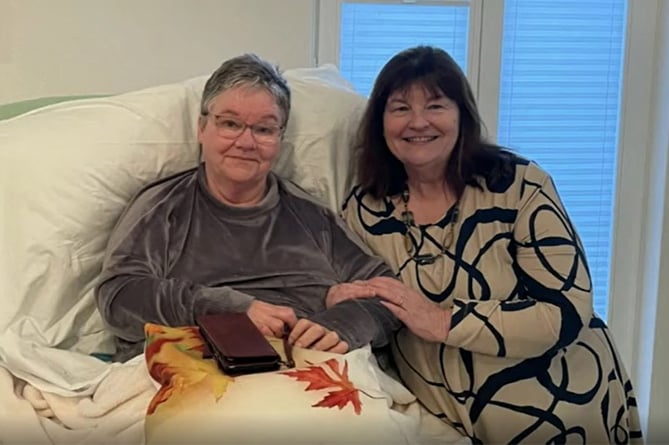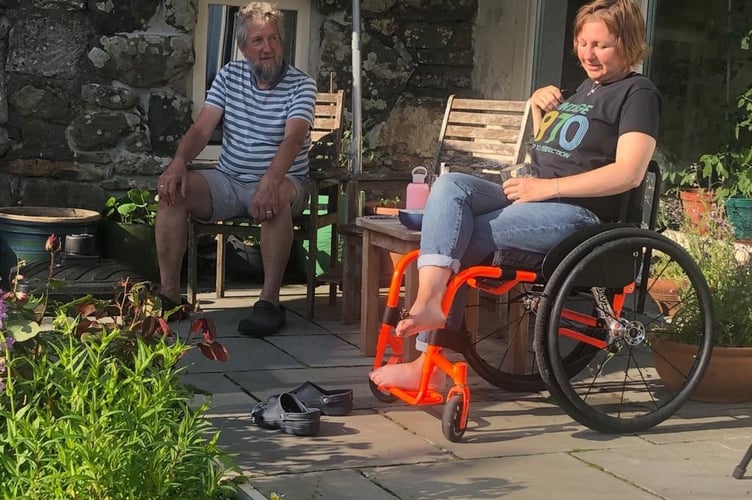“I want you to imagine being in a wheelchair, bed-ridden, doubly incontinent – reliant on drugs to prevent pain – and eventually you think, ‘I’m going to have to kill myself because this is unbearable’.
“But you can’t. That’s the position this country is forcing people into.”
This is the picture Louisa Eastland painted while looking out at the sea view through the windows at her home in Llanegryn, Gwynedd.
The 52-year-old former social worker lives with secondary progressive multiple sclerosis (MS) and she told the Cambrian News, for now, her pain and suffering are ‘bearable’.
But she worries about what will happen when her condition becomes what she describes as ‘unendurable’, and when no one can legally assist her passing.
She told us she wants to be allowed to die peacefully on her ‘hill in Wales’. But her only option currently is a vastly expensive assisted death in another country.
An appeal for urgent legislation
She reflected on the story of Cardigan woman Sharon Johnston who earlier this year opted to travel to Switzerland for a physician-assisted death at world-renowned medical charity Dignitas.

As we reported last week, the 60-year-old – who was paralysed from the neck down – was chaperoned to the charity’s clinic in Zurich by retired NHS manager Sue Lawford.
On her return, Cardiff-based Ms Lawford was arrested by Dyfed-Powys Police, put in a cell and held for 19 hours, and then subjected to a six-month police investigation – an ‘ordeal’ which she says severely damaged her mental health.
She went before the national press last week appealing for urgent legalisation of assisted dying in England and Wales.
It is already legal for a doctor to assist someone’s passing in certain circumstances in Netherlands, Belgium, Canada, New Zealand and parts of the US, South America and most of Australia.
It could soon be legalised in Scotland too with a bill set to go before Holyrood next year.
Assisted dying is categorised as a justice issue and not one concerning health, so it is not a devolved matter for the Welsh Government – though many including charities and politicians feel it should be.
Charities, some MPs and campaigners are seeking a new law in England and Wales which would permit assisted dying in cases where a patient is deemed by a doctor to be in the final six months of their lives, or they are terminally ill. It is backed by Plaid Cymru’s Ceredigion MP Ben Lake.
The Dignitas option
But the new law would not help Louisa, nor would it have helped Sharon.
Louisa’s MS is chronic, lifelong and could eventually become what Dignitas regards as ‘unendurable’.
She is a fully paid up Dignitas member and tells me she is planning to make her trip to Switzerland for an assisted death before she reaches the excruciating final stages of her illness.
She has been in a wheelchair since March last year after a serious relapse left her with limited mobility and neurological incapabilities.
She cannot urinate or defecate without assistance and risks choking when she eats food, though her pain is managed by taking strong medication.
Speaking of her home in the picturesque seaside village, she said: “It’s very beautiful.
“We moved here so I could see the sea from the room I’m sitting in.”
She was born in 1970 and was diagnosed with MS when she was only 19 years old.
Despite her illness, she became a qualified social worker and, later in life, a psychotherapist before she was forced to retire in 2014.
“I’m determined to take up the option of Dignitas even if it isn’t available in this country,” she said.
“Dignitas does allow patients whose disability is causing unendurable suffering.
“But of course, we need the law to change so people can have some sort of dignity in death – an assisted death – on these shores.”

Louisa told me she does not want to suffer the final stages of MS – and she is constantly afraid of what they entail.
“If I do have to go to Dignitas, I’m bound to have to go to early because, as you know from Sue, if anyone accompanied me, they can be arrested and investigated when they get back,” she said.
“Even somebody like her who was clearly doing it out of the goodness of her heart, didn’t even know the person she was taking and wasn’t in any way going to profit from her death.”
She described it as ‘absolutely ridiculous’ that none of her carers, including her partner, would be allowed to help her to Switzerland – despite the role and the profession being primarily about boosting autonomy and responding to a patients’ wishes.
“So, at the moment I have a choice. I have the choice of staying in this country until I’m in the last six months of MS – and I’d have to be lucky enough that this law gets passed before I get there,” she said.
“Or I have to go to Dignitas which will cost me at least £15,000 and I have to get myself there, so I have to go early enough when I’m not dreadfully ill – which is a bit crazy really.
“We’re talking about another 20 years I could live and I know I’m going to be a lot worse than I am now.
“And already people are telling me I’m amazing, brave, gutsy and all the rest of it but I’m not really – I’m just putting up with it.”
Life expectancy for MS patients can be about seven to 10 years less than someone without the disease.
Louisa told the Cambrian News she isn’t ready to die but she is deeply fearful of more serious relapses and the situation she and her family will be left in.
Hurdles and red tape
Though she supports plans for legalisation outlined in a Private Members’ Bill submitted to the UK Parliament last year, she wants reform to go further until Dignitas or an equivalent option exists in this country.
She assures us that not everyone can easily travel for an assisted death at Dignitas. The process is rigorous and bureaucratic.
Anyone seeking an assisted death at one of its clinics has to become a member and pay a yearly membership fee.
Dignitas says this is to support the medical side of its operation but also to promote strong public messaging against suicide.
Prospective patients must receive the ‘green light’ from its physicians – usually after sending extensive medical records for consideration – so they can qualify for an assisted death in a clinic.
Louisa says she is confident she will qualify when the time comes as her condition is lifelong and her suffering will soon be recognised as unendurable.
Once a patient meets the criteria, they must travel to Switzerland a few days prior to the treatment for doctors’ assessments and background checks – including meeting family members.
“
We need the law to change so people can have some sort of dignity in death – an assisted death – on these shores.
Louisa Eastland
Charity Dignity in Dying says more than 350 Britons have ended their lives at Dignitas’ clinics.
But there is widespread condemnation of the not-for-profit, particularly as its practices are perceived to go against medical principles.
Opponents also claim they potentially allow the vulnerable and those not of sound mind to be exploited. It is also often criticised by those from religious communities.
Under the plans put forward by Baroness Meacher in the Private Members’ Bill – and supported by charities like Dignity in Dying – a doctor and two high court judges would decide whether a patient qualifies for an assisted death.
“Obviously patient safety must be paramount in this process, but you can easily tell the people who have been shouting loudly about how they want to die,” Louisa added.
She joked: “’Well how come this old lady has never mentioned this idea until now, and she’s a bit scrambled in her thinking, and she’s surrounded by her sons and daughters who are owed financial hardship and she’s loaded’. It’s not that complicated, is it?”
She says it could easily become customary for NHS staff members to ask someone if they would be interested in an assisted death when their condition reaches a certain point, and then recorded to build a profile.
“I’m sat here, quite intelligent, quite audible – if I do say so myself – and I’m saying, ‘I’d quite like to die now’, or I will say it in the future, and people are saying no!” she said.
“How dare they say no?!”
She says her family, friends and everyone involved in her life has known how she wants to end her life for more than a decade.
Change in law long overdue
She and Sharon Johnston also both featured in a 2021 BBC Wales documentary, When Would You Want to Die?, openly discussing their wishes to have an assisted death.
Sharon became tetraplegic after a serious fall at her home, then in Aberystwyth. In February this year, she was granted an assisted death by Dignitas.
Ms Lawford – who accompanied Sharon for emotional and physical support – said: “The entire situation caused immense stress and heartache for Sharon on an already difficult journey.
“It has caused me immense stress and anxiety since our return.
“The BBC had filmed an entire documentary on Sharon, whose decision was as clear as day.
“A change in the law in the UK is long overdue. And it shouldn’t be limited to the terminally ill.
“Sharon’s situation was intolerable, yet could have continued for many years – and there are countless others like her without the means to end their lives on their own terms.”
Former NHS manager Sue Lawford was arrested by Dyfed-Powys Police on her return to Wales. Here she speaks to BBC News about her experience supporting Sharon Johnston
Sue says she accompanied Sharon to Switzerland on 14 February and was contacted by Dyfed-Powys Police and social services several times during the journey.
Swiss Police also arrived at Dignitas but Sue and Sharon reassured them and they were satisfied there was no illegal activity. They left without taking any action.
Sue says Sharon then had a calm, peaceful death early on the morning of 15 February. She says her last words were: “This is a lovely feeling.”
In the early hours of 16 February after she had returned from Switzerland, Sue was awoken by police and arrested for assisting a suicide.
Police officers searched her house for over four hours. They seized her phone, electronic devices, passport, and documents relating to her work.
Sue was kept in a police cell for 16 hours, before being ‘interrogated’ by Dyfed-Powys Police. After over 19 hours in custody, she was released ‘pending investigation’.
But the probe was dropped after six and a half months, due to ‘evidential difficulties.’
A Dyfed Powys Police spokesperson said: “It is a criminal offence in the UK to encourage or assist in the suicide or attempted suicide of another person.
“The circumstances of such cases increase the risk of vulnerable people being exploited and others making financial gain.
“A thorough criminal investigation is required to establish the facts of each case.”
“
Dying people in Wales and England cannot be left behind.
Sarah Wootton, Dignity in Dying chief executive
Chair of My Death, My Decision, Trevor Moore, said: “Sharon’s and Sue’s stories show why our current laws are completely broken.
“The lack of compassion they show in forcing an incurably suffering person to travel abroad for an assisted death, in the most difficult of circumstances, is shameful.”
He added that there is a current lack of political will for legalisation and the charity urges a governmental inquiry – with parties committing to follow the recommendations.
Sarah Wootton, chief executive of Dignity in Dying, said: “The evidence of the harm and injustice caused by the blanket ban on assisted dying is mounting and is now impossible to ignore.
“The Scotland, Jersey and Isle of Man parliaments are leading the way, with votes on assisted dying proposals expected in all three the next year.
“Dying people in Wales and England cannot be left behind as the rest of the British Isles moves on.”
An Assisted Dying Bill will be formally introduced in Scotland in the new year. It is widely expected to be passed into law by 2025 after 80 per cent of the public supported it during a consultation.
According to YouGov data, nearly four-fifths of people in the UK believe that people who provide practical help to someone to obtain a medically assisted death abroad should not face prosecution.
A Populous Poll in 2015 showed that 82 per cent of the English and Welsh public would support legalisation of assisted dying with parameters similar to those outlined in Baroness Meacher’s Bill.
It also found more than two fifths of the public would break the law to assist the death of a loved one.
However, the Church of Wales said: “The church, as a whole, holds to the belief that the sanctity and God-given nature of life is such that we do not have the moral right to end life in this way.”
But for Louisa, it is about autonomy, mercy and care for people who are suffering.
She wishes for nothing more than to die in the comfort of her home, looking out of her window at the sea with her family around her. Or, if it were summertime, in her beloved garden overlooking the Welsh coastline.
“That would be a glorious thing to happen and a way of ending my suffering where everybody who loves me can be a part of it,” she continued.
“And it can be a celebration. That’s all I want.”

.png?width=209&height=140&crop=209:145,smart&quality=75)


.png?width=209&height=140&crop=209:145,smart&quality=75)



Comments
This article has no comments yet. Be the first to leave a comment.